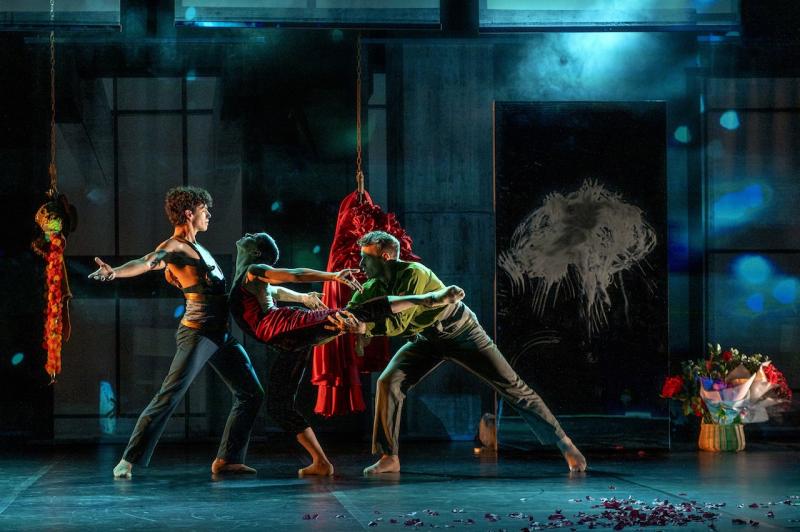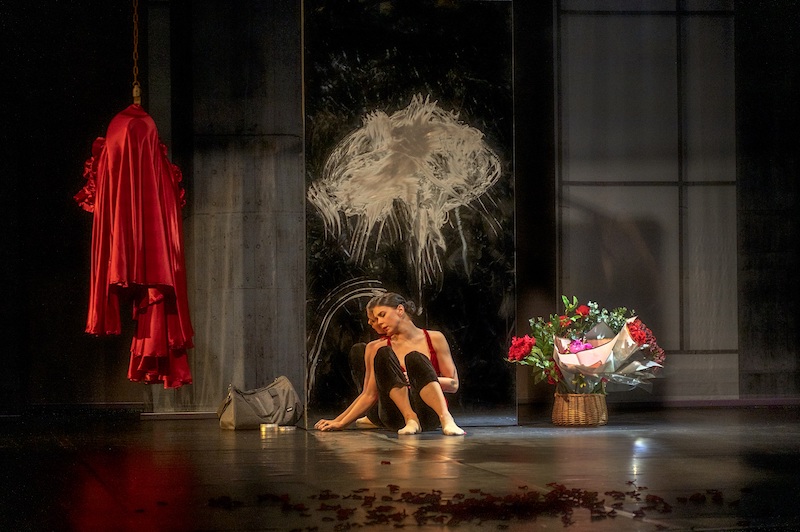Carmen, Queen Elizabeth Hall review - a flawed but fascinating retread | reviews, news & interviews
Carmen, Queen Elizabeth Hall review - a flawed but fascinating retread
Carmen, Queen Elizabeth Hall review - a flawed but fascinating retread
Osipova mesmerises in a new contemporary dance chamber-version that doesn't quite hit its mark

When Natalia Osipova comes a-calling, a choreographer doesn’t say no. The Bolshoi-trained ballerina, having commandeered all the prime roles in her nine years at the Royal Ballet, is always looking to conquer new territory. In a string of self-curated solo shows she has made forays into contemporary dance as well as staking out her supremacy as a dance-actress, often commissioning new work.
Most memorably, in 2019, she starred in The Mother, a contemporary telling of the pitch-dark story by Hans Christian Andersen, about a young woman prepared to fight Death itself to save her baby. Osipova has now procured what might seem to be the ultimate vehicle for her outsize talents – a reinterpretation of devil-may-care seductress Carmen, a Carmen more complex than any standard interpretation has allowed her to be.
And not before time. Georges Bizet’s operatic creation, inspired by a steamy best-selling novella of 1845, was a lubricious 19th century male fantasy of liberated female sexuality, of a free spirit defiantly giving rein to her appetites. But that power over men and the havoc she wrought had to be punished, hence her deadly comeuppance at the hands of a jealous lover. There’s no question that a Carmen for our times is overdue. Director-choreographer Didy Veldman’s contemporary-dance version premiered to a packed Queen Elizabeth Hall last weekend and must surely return for a longer run, if only to consolidate its best elements and deal with some questionable ones. Paring the story down to five characters, Veldman conceives it as a show-within-a-show, the preparation for a production of a filmed “Carmen” gradually infecting the relationships of cast and crew. This isn’t a new idea, viz the Bafta-winning 1983 flamenco movie Carmen that eventually migrated to the stage and toured internationally for years.
Director-choreographer Didy Veldman’s contemporary-dance version premiered to a packed Queen Elizabeth Hall last weekend and must surely return for a longer run, if only to consolidate its best elements and deal with some questionable ones. Paring the story down to five characters, Veldman conceives it as a show-within-a-show, the preparation for a production of a filmed “Carmen” gradually infecting the relationships of cast and crew. This isn’t a new idea, viz the Bafta-winning 1983 flamenco movie Carmen that eventually migrated to the stage and toured internationally for years.
For choreographic material Veldman draws inspiration from her dancers, all of them top-tier but from different disciplines. Her Jose is the fine contemporary dancer Jason Kittelberger, who has partnered Osipova on stage many times and also happens to be her actual boyfriend. Escamillo is English National Ballet star Isaac Hernández, whose prowess in virtuoso leaps and fancy footwork make him a natural for the arrogant toreador. He is dual-cast as director of the video, a glossy Carmen-themed fashion shoot, its sexed-up poses and extravagant threads conceived by Nina Kobiashvili with an unmistakeable eye to Instagram.
At times the film-Carmen seems to be working knowing clichés of desirability and glamour. That might explain why, off-set, Osipova (pictured above) is so unhappy and conflicted, roving the stage with bunched-up anger, hurling her body into anguished shapes. Either she’s uncomfortable with the dodgy messages her role as an insatiable siren is sending to her fans, or sick of the endless public appetite for Carmen's story. It’s possibly both but this could be made easier to read. A segment in which Osipova duets to tango music with cameraman Eryck Brahmania in mesmerising slow motion is transfixing, but I am at a loss to know how it relates to the whole.
The show’s second half comes into tighter narrative focus even as the line between the players and their film roles starts to blur. Osipova the working dancer loses the friendship of Hannah Ekholm’s Micaela after stealing her boyfriend Jose, and sets Jose and Escamillo at each others’ throats after sleeping with both. Kobiashvili’s set incorporates multiple gauze screens on which we see blurry projections of angry exits and street chases on foot, leaving plenty to the imagination.
Composer Dave Price (who supplied the terrifying soundworld for The Mother) offers an appealing reboot of Bizet’s music, scored for very different instruments and occasionally veering off into other styles such as jazz or klezmer. Practicalities presumably ruled out this being played live, but I was sorry not to find out what the instrument listed in the credits as a cavaquinho is. And much as I would not want to lose a moment of Price’s music, or a moment of Osipova’s extraordinariness, or any of the show’s three alternative endings, I suspect there is a shorter, less elliptical reading of Carmen waiting to emerge in a future edit that would say more of what its creator meant it to say about desire and disinhibition.
rating
Share this article
The future of Arts Journalism
You can stop theartsdesk.com closing!
We urgently need financing to survive. Our fundraising drive has thus far raised £49,000 but we need to reach £100,000 or we will be forced to close. Please contribute here: https://gofund.me/c3f6033d
And if you can forward this information to anyone who might assist, we’d be grateful.

Subscribe to theartsdesk.com
Thank you for continuing to read our work on theartsdesk.com. For unlimited access to every article in its entirety, including our archive of more than 15,000 pieces, we're asking for £5 per month or £40 per year. We feel it's a very good deal, and hope you do too.
To take a subscription now simply click here.
And if you're looking for that extra gift for a friend or family member, why not treat them to a theartsdesk.com gift subscription?
more Dance
 'We are bowled over!' Thank you for your messages of love and support
Much-appreciated words of commendation from readers and the cultural community
'We are bowled over!' Thank you for your messages of love and support
Much-appreciated words of commendation from readers and the cultural community
 R:Evolution, English National Ballet, Sadler's Wells review - a vibrant survey of ballet in four acts
ENB set the bar high with this mixed bill, but they meet its challenges thrillingly
R:Evolution, English National Ballet, Sadler's Wells review - a vibrant survey of ballet in four acts
ENB set the bar high with this mixed bill, but they meet its challenges thrillingly
 Like Water for Chocolate, Royal Ballet review - splendid dancing and sets, but there's too much plot
Christopher Wheeldon's version looks great but is too muddling to connect with fully
Like Water for Chocolate, Royal Ballet review - splendid dancing and sets, but there's too much plot
Christopher Wheeldon's version looks great but is too muddling to connect with fully
 iD-Reloaded, Cirque Éloize, Marlowe Theatre, Canterbury review - attitude, energy and invention
A riotous blend of urban dance music, hip hop and contemporary circus
iD-Reloaded, Cirque Éloize, Marlowe Theatre, Canterbury review - attitude, energy and invention
A riotous blend of urban dance music, hip hop and contemporary circus
 How to be a Dancer in 72,000 Easy Lessons, Teaċ Daṁsa review - a riveting account of a life in dance
Michael Keegan-Dolan's unique hybrid of physical theatre and comic monologue
How to be a Dancer in 72,000 Easy Lessons, Teaċ Daṁsa review - a riveting account of a life in dance
Michael Keegan-Dolan's unique hybrid of physical theatre and comic monologue
 A Single Man, Linbury Theatre review - an anatomy of melancholy, with breaks in the clouds
Ed Watson and Jonathan Goddard are extraordinary in Jonathan Watkins' dance theatre adaptation of Isherwood's novel
A Single Man, Linbury Theatre review - an anatomy of melancholy, with breaks in the clouds
Ed Watson and Jonathan Goddard are extraordinary in Jonathan Watkins' dance theatre adaptation of Isherwood's novel
 Peaky Blinders: The Redemption of Thomas Shelby, Rambert, Sadler's Wells review - exciting dancing, if you can see it
Six TV series reduced to 100 minutes' dance time doesn't quite compute
Peaky Blinders: The Redemption of Thomas Shelby, Rambert, Sadler's Wells review - exciting dancing, if you can see it
Six TV series reduced to 100 minutes' dance time doesn't quite compute
 Giselle, National Ballet of Japan review - return of a classic, refreshed and impeccably danced
First visit by Miyako Yoshida's company leaves you wanting more
Giselle, National Ballet of Japan review - return of a classic, refreshed and impeccably danced
First visit by Miyako Yoshida's company leaves you wanting more
 Quadrophenia, Sadler's Wells review - missed opportunity to give new stage life to a Who classic
The brilliant cast need a tighter score and a stronger narrative
Quadrophenia, Sadler's Wells review - missed opportunity to give new stage life to a Who classic
The brilliant cast need a tighter score and a stronger narrative
 The Midnight Bell, Sadler's Wells review - a first reprise for one of Matthew Bourne's most compelling shows to date
The after-hours lives of the sad and lonely are drawn with compassion, originality and skill
The Midnight Bell, Sadler's Wells review - a first reprise for one of Matthew Bourne's most compelling shows to date
The after-hours lives of the sad and lonely are drawn with compassion, originality and skill
 Ballet to Broadway: Wheeldon Works, Royal Ballet review - the impressive range and reach of Christopher Wheeldon's craft
The title says it: as dancemaker, as creative magnet, the man clearly works his socks off
Ballet to Broadway: Wheeldon Works, Royal Ballet review - the impressive range and reach of Christopher Wheeldon's craft
The title says it: as dancemaker, as creative magnet, the man clearly works his socks off
 The Forsythe Programme, English National Ballet review - brains, beauty and bravura
Once again the veteran choreographer and maverick William Forsythe raises ENB's game
The Forsythe Programme, English National Ballet review - brains, beauty and bravura
Once again the veteran choreographer and maverick William Forsythe raises ENB's game

Add comment